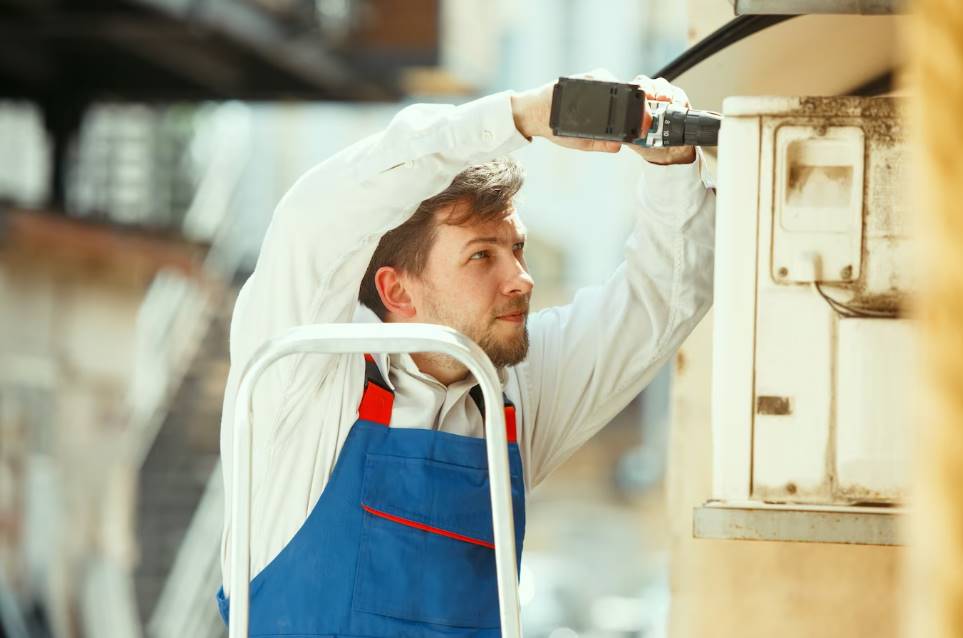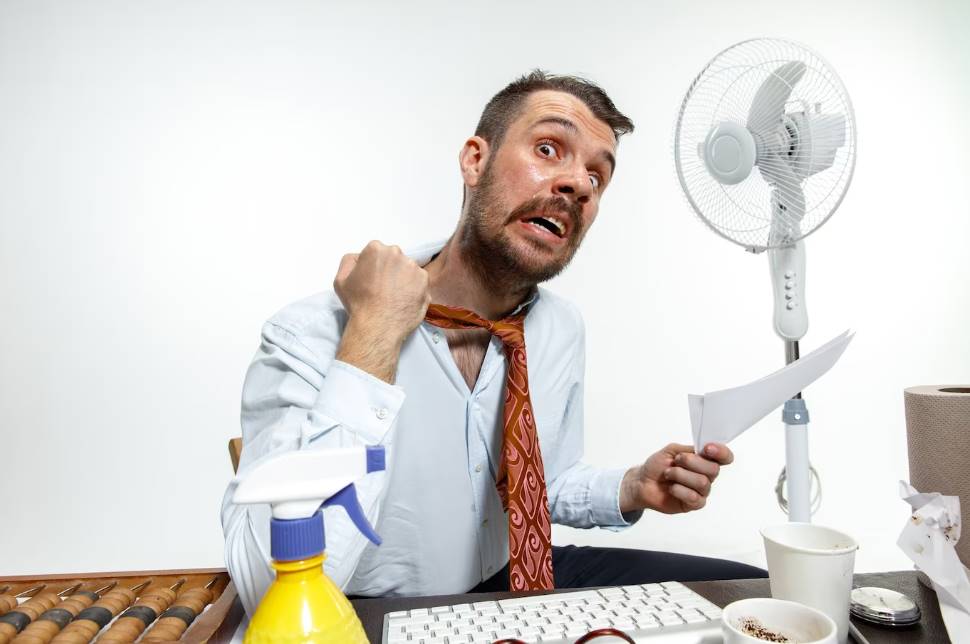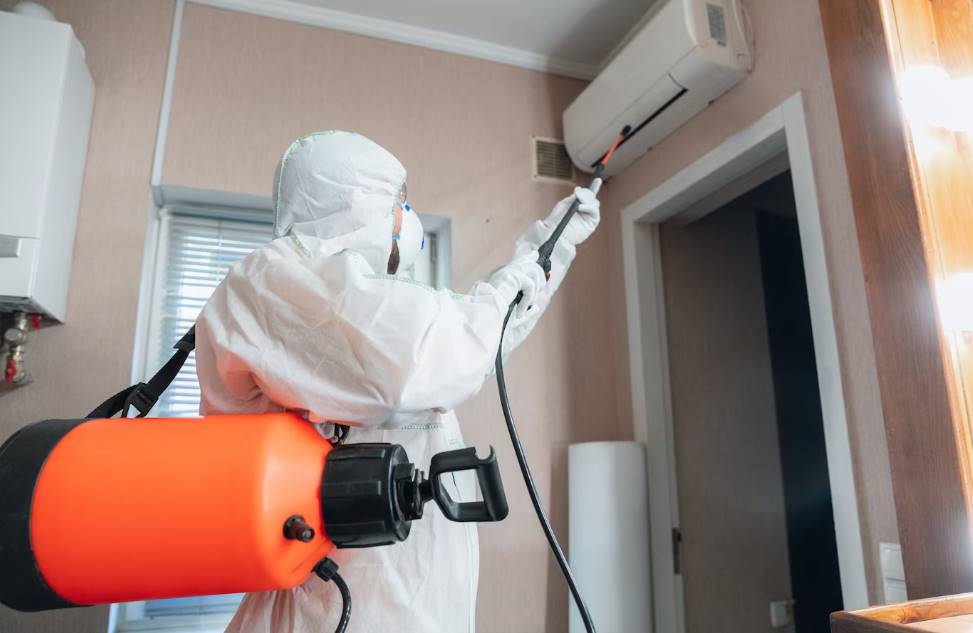The condenser coils may need cleaning if your air conditioner isn't producing cold air or working. In addition to enhancing the air quality you breathe, maintaining clean a/c coils increases the unit's lifespan and efficiency. You can avoid spending a lot of money on maintenance and repairs by taking good care of the a/c coils.
Cleaning the air conditioner coils is crucial to the long life of a central air conditioning system. Cleaning the coils in your air conditioner is a vital part of routine maintenance that will keep your system running efficiently, for less money, and for longer. In this article, we'll show you how to clean your air conditioner's indoor and outdoor coils, and we'll go over what to do if that doesn't fix the problem.
Understanding Air Conditioning Coils
The air conditioner wouldn't function without the AC coils. They work to expel the indoor air's heat and moisture into the outdoors. The refrigerant gas inside the tubes absorbs heat, and the fins dissipate it into the ambient air.
The constant circulation of refrigerant gradually removes the heat in your home until the thermostat is set to the desired level. Two coils are involved in the cooling process: the evaporator and the condenser. First, let's take a look at the evaporator coil.
Keeping the AC coils clean and in good condition is essential for optimal air conditioning performance. Air conditioning efficiency is decreased, and energy costs are increased when the AC coils are dirty. Understanding AC coils' function, types, and components is crucial to operating and maintaining them properly.
Signs of a Dirty Air Conditioning
Your air conditioner's efficiency and cleanliness are negatively impacted by dirt and dust. If there are contaminants in the room, they will be spread around by the air conditioner and have an adverse effect on your health.
- There Has Been An Increase In Your Electricity Bill. A dirty air conditioner's coils could be to blame for a mysterious spike in your monthly energy costs. After cleaning the coils, your air conditioner should function normally again, saving you money on your electricity bill. When air conditioners aren't running at peak efficiency, they use more power. Your monthly energy costs will increase as a result of this. You should immediately clean the AC coils if you see any of these warning signs.
- The Duration Of Your Unit's Operation Seems To Be Increasing For No Apparent Reason. It takes the air conditioner more time and energy to cool the interior when the coils are dirty. For an extended time, you will be able to both hear and feel the blower running and air rushing out of the vents. In addition to the higher energy costs we discussed, this can also cause additional wear and tear on your unit, shortening its useful life.
- Your House Is Not As Refreshingly Cool As It Could Be. Heat will be trapped if the coils are filthy or obstructed. You can compare it to a traffic jam that prevents the heat from your home from escaping through the vents. Therefore, the air conditioner will only produce slightly cooled or warm air. When each room has its own air conditioner, this becomes immediately apparent. If the evaporator coils in your central air conditioner are dirty, the temperature in some rooms may rise above the norm. When your AC's cooling capacity drops and it takes longer than usual for the unit to release air at the correct temperature, this is a sign that the evaporator coil needs cleaning.
- Frost Forms On The Coil While It Is In Operation. Condensation can actually freeze on the coil if the coil is very dirty. This is definitely different from the norm and indicates a serious lack of cleanliness. If this step is skipped, a complete shutdown of the air conditioner's cooling ability could occur.
- Increased Humidity Inside. The evaporator coil lowers indoor humidity by extracting heat and moisture from the air. This process is less effective when the coil is blocked or dirty, and you may notice that it is more humid in your home than usual.
The filth on the evaporator coil prevents as much heat from reaching it. As a result, the unit will generate less condensation. Your house will continue to accumulate condensation because of this. Signs of increased humidity inside include fogged windows and a damp, clammy atmosphere.
When Should You Clean Your AC's Coils?
Once a year, you should clean the coils in your AC unit. Coils should be cleaned more frequently or as needed if the air conditioner is used frequently or if the exterior or interior of the building is dirty (from leaves, pollen, or dirt). The coils should be cleaned in the spring and maybe again in the middle of summer.
The coils should be thoroughly cleaned once a year, typically before the cooling season begins. It takes about an hour to clean the AC coils completely. The first time you clean your condenser coil or a/c evaporator coil after construction or installation will be the hardest, but every subsequent cleaning will be a breeze.
Annual inspections by a professional HVAC technician are recommended, ideally first before warm weather arrives and your air conditioner is put to heavy use. They can clean the condenser coils, replace the filters, and test your air conditioner so that it is ready to go when you need it. Furthermore, our online scheduling tool facilitates easy service arrangements.
AC Coil Maintenance
The AC coils in your system are a crucial part of the cooling process. Your home's heat is sucked up by the evaporator coil and then discharged by the condenser coil. Dirty or malfunctioning coils in an air conditioner can lead to increased energy consumption and repair costs.
Regular maintenance is required to avoid these problems and keep your air conditioner operating efficiently. The most important part of AC coil maintenance is keeping the coils clean. Dirt, dust, and other airborne particles have a propensity to get caught in the fins of the evaporator coil, which is located inside your home. As a result, your air conditioner will have to work harder than necessary, driving up your energy bills and increasing the likelihood of breakdowns.
The condenser coil, also located outdoors, is susceptible to the same problems, especially when leaves begin to fall from nearby trees in the fall and winter. Your air conditioner will have to work harder and less efficiently if dirt and debris are blocking airflow to the coil, reducing the coil's ability to release heat. The efficiency of your air conditioner, the longevity of its components, and the avoidance of expensive repairs all depend on how often you clean the coils.
AC Coil Cleaning Is Cost-Effective
Although the methods described above are effective, many homeowners would be better off hiring a reputable HVAC professional to do the job for them. Avoiding having your coils cleaned regularly can lead to costly repairs in the long run. Some HVAC suppliers offer cheap "clean and check" discounts. For a fee, others may provide maintenance, such as periodic checks and cleanings, as well as a guarantee against breakdown and a reduction in repair costs. Cleaning the AC coils is a cheap way to take care of your system when you consider the benefits you'll receive in terms of system longevity, energy efficiency, operating costs, comfort, and the avoidance of costly repairs. If your Carrier HVAC system needs servicing, call up the pros in your area. They will perform necessary maintenance on your air conditioner to ensure its optimal functioning throughout the season.
Conclusion
Clean air conditioner coils are essential for maintaining the efficiency and longevity of a central air conditioning system. The evaporator and condenser coils play a crucial role in the cooling process, and maintaining them clean is essential for optimal performance. Dirty air conditioner coils can lead to various issues, such as increased electricity bills, longer operation durations, and a lack of refreshing cooling. Dirty coils can trap heat, causing the air conditioner to only produce slightly cooled or warm air. Additionally, if the evaporator coils in a central air conditioner are dirty, the temperature in some rooms may rise above the norm, indicating a need for cleaning. If the coils freeze during operation, it indicates a serious lack of cleanliness, potentially leading to a complete shutdown of the air conditioner's cooling ability. Therefore, it is crucial to clean the air conditioner coils to avoid costly maintenance and repairs.
The evaporator coil in an air conditioner lowers indoor humidity by extracting heat and moisture from the air. However, blocked or dirty coils can increase humidity inside the home, leading to condensation accumulation. To maintain the efficiency of your air conditioner, clean the coils once a year, particularly before the cooling season begins. Regular inspections by a professional HVAC technician are recommended, ideally before warm weather arrives.
Maintenance is crucial for the evaporator and condenser coils, as dirty or malfunctioning coils can lead to increased energy consumption and repair costs. Regular cleaning helps prevent dirt, dust, and other airborne particles from getting caught in the coils, causing the air conditioner to work harder and increase energy bills.
Reputable HVAC professionals can perform regular cleanings for a cost-effective solution. Some suppliers offer "clean and check" discounts or provide maintenance, such as periodic checks and cleanings, as well as a guarantee against breakdowns and reduced repair costs. Cleaning the AC coils is a cost-effective way to maintain system longevity, energy efficiency, operating costs, comfort, and avoid costly repairs.
Content Summary:
- The condenser coils may need cleaning if your air conditioner isn't producing cold air or working.
- In addition to enhancing the air quality you breathe, maintaining clean a/c coils increases the unit's lifespan and efficiency.
- You can avoid spending a lot of money on maintenance and repairs by taking good care of the a/c coils.
- Cleaning the air conditioner coils is crucial to the long life of a central air conditioning system.
- Cleaning the coils in your air conditioner is a vital part of routine maintenance that will keep your system running efficiently, for less money, and for longer.
- In this article, we'll show you how to clean your air conditioner's indoor and outdoor coils, and we'll go over what to do if that doesn't fix the problem.
- The air conditioner wouldn't function without the AC coils.
- Keeping the AC coils clean and in good condition is essential for optimal air conditioning performance.
- Air conditioning efficiency is decreased, and energy costs are increased when the AC coils are dirty.
- Your air conditioner's efficiency and cleanliness are negatively impacted by dirt and dust.
- A dirty air conditioner's coils could be to blame for a mysterious spike in your monthly energy costs.
- After cleaning the coils, your air conditioner should function normally again, saving you money on your electricity bill.
- It takes the air conditioner more time and energy to cool the interior when the coils are dirty.
- Heat will be trapped if the coils are filthy or obstructed.
- You can compare it to a traffic jam that prevents the heat from your home from escaping through the vents.
- Therefore, the air conditioner will only produce slightly cooled or warm air.
- If the evaporator coils in your central air conditioner are dirty, the temperature in some rooms may rise above the norm.
- When your AC's cooling capacity drops and it takes longer than usual for the unit to release air at the correct temperature, this is a sign that the evaporator coil needs cleaning.
- If this step is skipped, a complete shutdown of the air conditioner's cooling ability could occur.
- The evaporator coil lowers indoor humidity by extracting heat and moisture from the air.
- This process is less effective when the coil is blocked or dirty, and you may notice that it is more humid in your home than usual.
- The filth on the evaporator coil prevents as much heat from reaching it.
- As a result, the unit will generate less condensation.
- Signs of increased humidity inside include fogged windows and a damp, clammy atmosphere.
- Once a year, you should clean the coils in your AC unit.
- Coils should be cleaned more frequently or as needed if the air conditioner is used frequently or if the exterior or interior of the building is dirty (from leaves, pollen, or dirt).
- It takes about an hour to clean the AC coils completely.
- The first time you clean your condenser coil or a/c evaporator coil after construction or installation will be the hardest, but every subsequent cleaning will be a breeze.
- Annual inspections by a professional HVAC technician are recommended, ideally first before warm weather arrives and your air conditioner is put to heavy use.
- They can clean the condenser coils, replace the filters, and test your air conditioner so that it is ready to go when you need it.
- The AC coils in your system are a crucial part of the cooling process.
- Your home's heat is sucked up by the evaporator coil and then discharged by the condenser coil.
- Dirty or malfunctioning coils in an air conditioner can lead to increased energy consumption and repair costs.
- Regular maintenance is required to avoid these problems and keep your air conditioner operating efficiently.
- The most important part of AC coil maintenance is keeping the coils clean.
- The condenser coil, also located outdoors, is susceptible to the same problems, especially when leaves begin to fall from nearby trees in the fall and winter.
- The efficiency of your air conditioner, the longevity of its components, and the avoidance of expensive repairs all depend on how often you clean the coils.
- Although the methods described above are effective, many homeowners would be better off hiring a reputable HVAC professional to do the job for them.
- Avoiding having your coils cleaned regularly can lead to costly repairs in the long run.
- Some HVAC suppliers offer cheap "clean and check" discounts.
- Cleaning the AC coils is a cheap way to take care of your system when you consider the benefits you'll receive in terms of system longevity, energy efficiency, operating costs, comfort, and the avoidance of costly repairs.
- If your Carrier HVAC system needs servicing, call up the pros in your area.
- They will perform necessary maintenance on your air conditioner to ensure its optimal functioning throughout the season.
Frequently Asked Questions About Air Condition
Cleaning AC coils is crucial because dust, dirt, and debris can accumulate on them over time, reducing the efficiency of your air conditioner. Dirty coils make it harder for the AC to cool your space, leading to higher energy bills and potential system breakdowns.
You can clean AC coils yourself with the right tools and instructions, as outlined in our guide. However, if you're not comfortable or experienced with DIY maintenance, it's advisable to hire a professional HVAC technician to ensure thorough and safe cleaning.
The frequency of cleaning depends on several factors, including your location, usage, and the presence of dust and debris. In general, it's recommended to clean the coils at least once a year, typically before the cooling season begins. However, if you notice reduced cooling efficiency, it's best to clean them sooner.
Neglecting AC coil cleaning can lead to several problems, including reduced cooling efficiency, higher energy bills, and a shorter lifespan for your AC unit. Over time, the accumulated dirt and debris can cause the system to work harder, potentially resulting in costly repairs or premature replacement.
Yes, safety is essential when cleaning AC coils. Before starting, always turn off the power to your AC unit to prevent electrical accidents. Wear protective gear like gloves and safety goggles to shield yourself from cleaning chemicals and debris. Additionally, make sure the AC unit is securely supported if you're working on elevated outdoor condenser coils to avoid injury.



